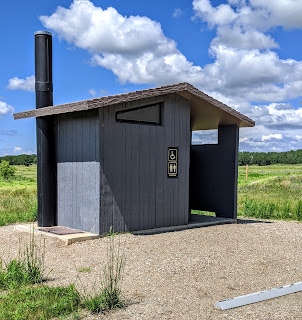One of the many definitions of recycle is, "to pass through a cycle again;repeat a process from the beginning." In my life, recycling has been evident whether it be beliefs, interests, lifestyle, or perspectives. The ongoing coronavirus pandemic has brought back actively "minimizing" my life and footprint. I find it more than Marie Kondo's question, "Does it spark joy?" My ongoing efforts to minimize go beyond the material stuff into emotional, relational, and spiritual aspects of daily living.
 |
| Storage Units in Argusville ND |
While some construction has slowed, I have noticed storage units being built in many locations. It appears to be a common denominator that we all have more stuff than can be stored in our homes. From personal experience, maintaining an accessible place out of the elements where things I rarely need can be securely kept is a costly proposition. So I ask myself, "Why do I need this stuff? Am I fearful that something I own is so precious that I cannot survive without it? If it is so important, why do I place it out of my reach?"
During the pandemic the new question I have learned to ask myself, "Is this necessary?" Is it necessary to go into that business or store for that item? Is it necessary to go into the convenience store when I can pay at the pump? Is it necessary to get new clothes when I rarely get into the public to work? Video conferences are not fashion statements (although the market place tells us how to decorate the walls behind us.)
Another way I heard this question was, "Is it essential?" A great deal of energy has been expended defining what or who is an essential business or worker. I chuckled when someone (after weeks of being closed) stated that churches are essential businesses and clergy are essential workers. Is it necessary to meet in a building or be face-to-face in order for faith to be nurtured? I have come to realize that a lot of what I think about and react to is out of entrenched habits not necessity. When automatic attitudes and habits that have worked in the past are challenged, the response is often to say they are essential.
 |
| 2 sizes of winter sleds |
Further pondering leads me to ask, "Am I fearful of change?" In preparing for long distance events it is said that we often "pack our fears." What happens if I run out of clean socks? What if it takes longer and I run out of food? Can I really go 3 days without brewed coffee? Then I also need enough stove fuel. What if a canister isn't full? Looking at the picture of winter sleds I can pack a lot of fears (and extra pounds) on the blue/red sled. AND that sled is made of heavier material! I speak from experience. I packed enough food for a multiple day bikepacking trip. As I was riding I ate some of the packed food. When I came into towns I bought hot foods I craved telling myself I would eat the packed food later. I carried way too much food. Most of the packed food was not necessary. I packed my fears before I honestly answered the "what if?" question. I have never been malnourished. I have never been without clothing. I may smell, but I survived.
What is essential? I believe the deeper question is, "Am I essential?" The world was spinning before I was born and it will keep spinning after I am dead. Those people with whom I am close, those people with whom I am in relationship will certainly survive without me. I currently have no debts nor regrets. So again I ask myself, "What fears am I packing?"
Minimizing, taking stock of what is necessary, and viewing most things in life as not essential, I believe are crucial to experiencing freedom. The "what ifs" have been foisted upon us by others for a variety of reasons most of which promote fear. The pandemic has allowed for a recycling, a time to explore and test, and for me a time to work at breaking free. My goal as I once again recycle is to gain greater freedom, tranquility, and serenity seeing each day as a gift.
You can view my YouTube channel at this link. I post new content every 2 weeks.





